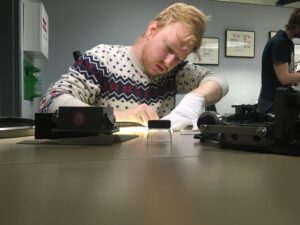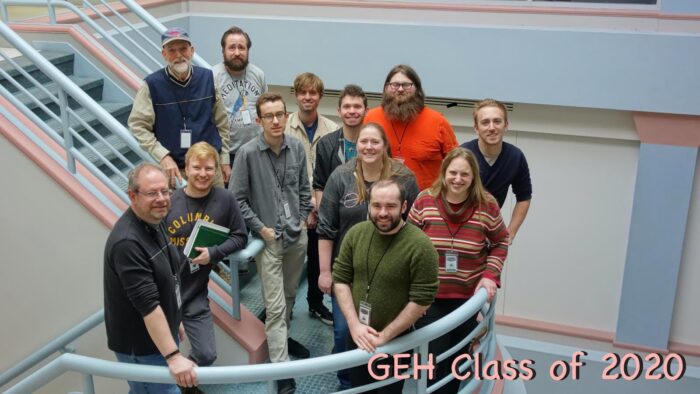
If you would have told Zack Neuman in college that he would become a film preservationist, he wouldn’t have believed you. “I would think, that’s the coolest thing in the world,” Zack reflects, “Heck, I still think that’s the coolest thing in the world.”
Zack graduated in 2018 from the Art + Design Department at Missouri State with a BFA in Art, majoring in Photography. He cites the philosophy behind the program and the hands-on learning students are provided as the reason he was drawn to the program. “I chose [it] to gain experience in the darkroom and to work with tangible materials,” says Zack, “I did not know it at the time, but that experience would become the foundation of my work as a film archivist.”
During the beginning of college, Zack considered his love for movies as a “side thing.” He took film classes every semester–even though they weren’t required for his program. The summer before his senior year, Zack was studying abroad in Florence, Italy, when he learned of a film festival hosted in Bologna focusing specifically on film restoration. “The fact that there was a festival and an entire field devoted to restoring classic and obscure cinema blew my mind,” Zack marvels.
Upon arrival back at Missouri State, he had a realization that prompted him to question his initial career path, as well as push him to pursue his passion. Zack was able to maintain his Photography major, but also gain a customized Film minor due to his semesters of non-mandatory film classes. “Film preservation was the crossroads where all my passions met. With my work in photography, I loved the physical nature of shooting on film and the printing process. Even my own photography work used an analog process in the dark room,” shares Zack, “Digital restoration work of motion pictures was just an extension of that.”
Zack recently completed a certificate in Film Preservation from the George Eastman Museum, within The L. Jeffrey Selznick School of Film Preservation. His certificate program lasted ten months and completely expanded his knowledge of film preservation, as well as all the many functions within it. “Film preservation is such a multifaceted endeavor that a lot of ground needs to be covered,” explains Zack, “It’s hard to explain everything we trained for, but the program covers every basis of what you would need to know [about] how to run a film archive.”

Currently, Zack is going through the same disheartening experience of job searching that many students are facing or are about to face. Working in the arts adds more challenge to this dilemma. “The arts and humanities field has increasingly turned into a gig economy even before the global pandemic,” explains Zack, “Some resort to freelance or contract work, but that leaves people vulnerable and without benefits. The pandemic has only exacerbated this.” His advice to students encourages continued persistence, drive and the trusting of their abilities, combined with the vital necessity of self-care. “You might find yourself at a job you truly hate, but keep fighting,” Zack reassures, “It could take a while to get where you want to be, but small victories are still victories.”

Through these formidable times, Zack has sought inspiration from those around him and their enthusiasm for their own dreams. He finds that the sharing of passions between individuals is what comforts him the most. “Surround yourself with people whose passion and empathy are overwhelming and who push you to be a better version of yourself,” encourages Zack.
Zack still sees it as hard to believe that he went through the Selznick program; he advises students to trust their gut toward what truly drives them. “A few years ago, I never would have thought [the Selznick program] was a possibility. Now, to past me, I would have to say, ‘Why not?’,” says Zack, You can’t be afraid to surprise yourself with what you really want to do.
